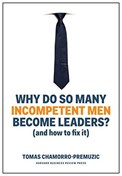- Leadership
Women Leaders Vs Less Competent Men
New book laments the preponderance of incompetent men blocking the progress of women leaders and offers some solutions
Optimistically one could see the Brexit debate in the UK Parliament or the Trump/Congress stand-off in the U.S. as vibrant democracies in action, but it’s perhaps more realistic to see these situations as demonstrations of grossly incompetent leadership.
Two leading figures in these debacles, Theresa May and Nancy Pelosi, are both women, and maybe if there was gender parity in senior leadership across our political and business institutions incompetent leadership would still continue unchecked.
Tomas Chamorro-Premuzic takes a different view. Based on decades of research, he contends that competent women who could make a positive difference are held back from reaching the top, not because of barriers or prejudices slowing their advancement, but because their way is blocked by the promotion of too many far less competent men.

May and Pelosi are two of many notable exceptions, but women make up only a relatively small minority of senior leaders around the world, and men are undeniably overrepresented in both political institutions and company boardrooms. Tomas Chamorro-Premuzic, a professor of business psychology at Columbia University, sees this lack of gender parity as a key reason for poor senior leadership performance and a hinderance to corporate success.
He quotes a global Gallup survey which showed that 75% of people who quit their jobs do so because of their direct line manager, and another survey showing 65% of Americans saying they would rather change their boss than get a pay rise. In a business world where the competition for talent is fierce and where depressing levels of low employee engagement are widely reported, these results are seriously worrying.
According to Chamorro-Premuzic organizations looking for leadership potential in recruits and employees need to consider three key attributes: intellectual capital (knowledge and expertise), social capital (networks and social connections) and psychological capital (emotional intelligence and compatibleness); alongside this they must also consider the cultural context they hope for the promoted new leader to fit into. In identifying leadership potential, it is then crucial that these attributes are measured accurately and rationally. It is absolutely essential that, as is too often the case, judgements are not primarily based on instinct.
The reliance on instinct has, according to Chamorro-Premuzic, led to a universal tendency for organizations to reward typically male characteristics of over-confidence, extraversion and charisma. These male leadership traits, which can backfire as narcissism and psychopathy, might have been appropriate in ‘command and control’ management cultures of the past but do not correlate with success in a modern context.
While women leaders are often rated more highly by their bosses and colleagues than men, and while female characteristics of high EQ and high self-awareness are acknowledged as invaluable attributes for competent leadership today, the evidence is that organizations, based on instinct rather than measurement, revert to outdated stereotypes when seeking leadership talent and promoting employees into senior leadership. Consequently, competent women – and men who don’t fit the stereotype – are overlooked and their progress inhibited by the preponderance of less competent men.
Why Do So Many Incompetent Men Become Leaders? (and how to fix it), by Tomas Chamorro-Premuzic. Published by Harvard Business Review Press, 2019, ISBN 978-1-63369-632-7
Columbia Business School is the only Ivy League institution that delivers a learning experience where academic excellence meets real-time exposure to the pulse of business in New York City.
ARTICLES YOU MIGHT LIKE
BOOK REVIEW
Patrick Faniel demonstrates the power of clear restricted focus and the danger of spreading leadership attention too thinly
DEVELOPING LEADERS QUARTERLY MAGAZINE AND WEEKLY BRIEFING EMAILS

































